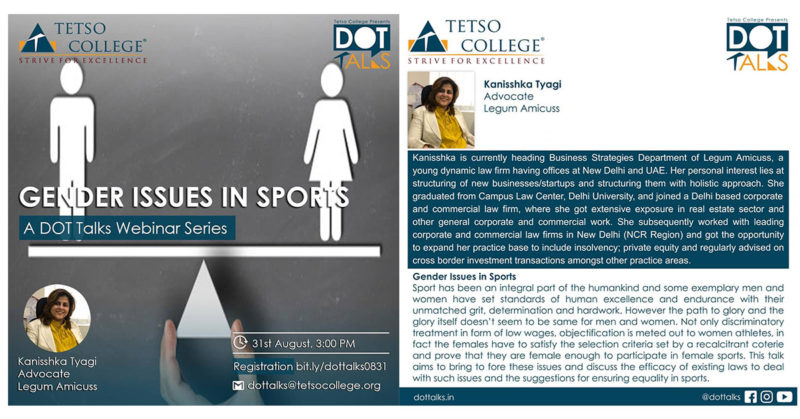In a country covered with arenas, fields and pitches, issues of gender discrimination in sports aren’t always easy to discuss. For this, in continuation with the DOT Talks Webinar Series, Tetso College invited Adv. Kanisshka Tyagi, Head of the Business Strategies Department of Legum Amicuss, New Delhi to speak on the topic “Gender Issues in Sports” in a Webinar on 31st August, 2020 which was facilitated and moderated by Dr. Aniruddha Babar, Assistant Professor, Department of Political Science.
According to Adv. Tyagi, sports have been an integral part of humankind and some exemplary men and women have set standards of human excellence and endurance with their unmatched grit, determination and hard work. She feels that the path to glory and the glory itself doesn’t seem to be same for men and women. “Not only discriminatory treatment in form of low wages or salary, objectification is meted out to women athletes, in fact, female athletes have to satisfy the selection criteria set by a recalcitrant coterie and prove that they are female enough to participate in female sports,” she pointed out.
Tyagi observed sports culture through critical eyes and approached cultural assumptions in sports, such as “men are stronger than women”, “women are more emotional than men”, “male athletes are better than female athletes”, and “good athletes look a certain way”. She believed that as sports is historically linked to upper-class masculinity, it also assumes a stoic and idealized athletic body that excludes many and often contradicts principles of emotional and physical health.
There were discussions regarding women athletes merely showcased as ‘objects of desire’ rather than as athletes at all. While women sportspersons in tennis and athletics are largely projected from sensational motives, Indian sports field rarely permits women sports to be projected as sensational. Examples like Sania Mirza could be stand-alone examples. Speaker also cited the example of Dutee Chand, who drew plaudits from equality advocates over the issue of her sexuality, but brickbats from her family — most notably, her sister Saraswati, who has accused her of being misled and blackmailed into a relationship at great cost to her career.
The way sports are presented in the media also perpetuates traditional gender norms. According to Tyagi, many studies show that only about four per cent of media coverage goes to girls’ and women’s sports. “The exception,” says speaker, “is the Olympics. But this coverage focuses on sports seen as traditionally appropriate for women, like gymnastics or swimming.”
The participants agreed that as society has adapted to changing times of femininity, modesty and tolerance have been redefined. As these terms have gained new meaning, female sports have gained a new role within our society. Time has passed; society has removed the barriers of orthodoxy to a great extent. The participants believed that at present, women’s sports do not bring in the revenue or get support like the most popular men’s sports. Yet this may change if female athletes are given the resources and opportunities to accomplish athletic feats and greatness.

